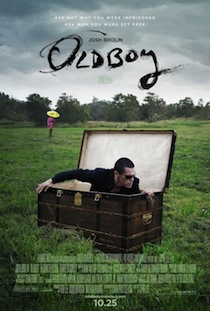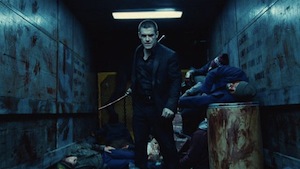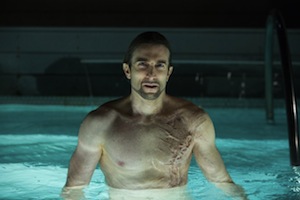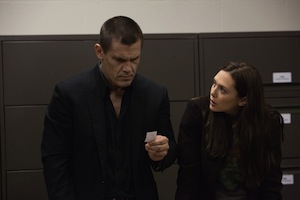 With the release of Spike Lee’s remake of Park Chan-wook’s Oldboy, I ponder the growing tendency to create English language versions of recent films, and explore how Spike Lee can make something look so similar yet get the content of Oldboy so wrong.
With the release of Spike Lee’s remake of Park Chan-wook’s Oldboy, I ponder the growing tendency to create English language versions of recent films, and explore how Spike Lee can make something look so similar yet get the content of Oldboy so wrong.
In the past decade, there has been a developing trend to take a current successful foreign language film, and remake it in the hands of an established American director. Many of these remakes occur within a few years of their originals.
Matt Reeves’ Let Me In was released two short years after Tomas Alfredson’s Let the Right One In, and it was just two years between the foreign and domestic version of The Girl with the Dragon Tattoo.
If the original film did not work, then a remake is an opportunity to tap into the hidden potential of an overlooked story. Films like The Thing, The Fly, or even Little Shop of Horrors were each relegated to the 1950’s and 60’s B-Movie dungeon. In the hands of capable directors, like Frank Oz, John Carpenter, or David Cronenberg, who saw the potential for fear or comedy in these forgotten films, the remake is rejuvenation.
 But the remake is no longer the realm of exploring previously missed opportunities. Now, excellent films can be remade simply because the actors onscreen speak the wrong language.
But the remake is no longer the realm of exploring previously missed opportunities. Now, excellent films can be remade simply because the actors onscreen speak the wrong language.
The danger in remaking a great film is that it does one of two things from the onset. First, it draws scrutiny from an existing audience familiar with the source material. This can limit creativity and a director’s ability to interpret the material in his or her own way. Push too far from the original, and the existing audience will balk.
If the remake is too similar, the other side of this treacherous coin, then the question as to why create the remake in the first place arises. Even if the remake is good, as in the case of Let Me In, its necessity is always in question, since the original stands above it.
Most of these recent remakes fall somewhere in the middle between too close and too far from the original, and so it is with Spike Lee’s Oldboy.
The visual trappings of the film hold remarkably true to the 2003 original, but the core of what Park does in his film is sadly missing. In his need to adjust for the North American market, Lee adds a moral and penance for all involved. The emotional relentlessness of Park’s Oldboy is gone and all that is left is a hollow cathartic shell.
 The fundamental changes to the story that ultimately undermine it cannot be discussed in any fruitful way without spoiling all surprises. If you need to judge for yourself, and I would encourage you to do so, STOP READING NOW.
The fundamental changes to the story that ultimately undermine it cannot be discussed in any fruitful way without spoiling all surprises. If you need to judge for yourself, and I would encourage you to do so, STOP READING NOW.
The first two acts of the film are largely the same. Joe Doucett (Josh Brolin), an alcoholic advertising agent, is kidnapped, framed for the rape and murder of his wife, and then released 20 years later. Once released, Joe begins to search for the person who may have imprisoned him and his now adult daughter.
Along the way Joe falls in with Marie (Elizabeth Olsen), a young woman with a soft spot for lost causes. Joe’s torment continues beyond the discovery of his captor, Adrian (Sharlto Copley). It seems that Joe is caught in a Rumpelstiltskin-like game, and must not only reveal the name of his tormentor, but why he is being tormented.
Those who have seen the original version may be happy with the description so far, but the changes that rupture the story come late in Spike Lee’s offering.
So let’s talk brass tacks. The two big changes that Lee’s version makes are to change the nature of Adrian’s relationship to his sister, and change Joe’s reaction to the full revelation of his own relationships.
 Adrian is no longer his sister’s lover, but is a victim of an abusive father. His character lacks the nonsensical and random deviance of the original. By giving him an incestuous father, Adrian’s actions get simple answers and sadly reduce the complexity of this character from the original.
Adrian is no longer his sister’s lover, but is a victim of an abusive father. His character lacks the nonsensical and random deviance of the original. By giving him an incestuous father, Adrian’s actions get simple answers and sadly reduce the complexity of this character from the original.
When Joe finds out that his new lover is also his daughter, he decides to return to his prison as punishment for his transgressions. Unlike Park, Lee cannot commit to Joe choosing the much more confusing path which emerges if Joe chooses to stay with Marie as a lover, less a daughter.
My suspicions are that when discussing a remake, Spike Lee and the other decision makers involved did not think that a North American audience would accept a father who was implicit in his own tormented and incestuous relationship with his adult daughter. Unfortunately that is exactly why Park Chan-wook’s original is so remarkable.
Park pushes his viewer far beyond their perceived psychological boundaries to elicit an almost physical revulsion. Watching the 2003 Oldboy, we accompany the characters on their path and come to the same confusing crossroad that they do.
Lee takes the easy path and punishes or releases each of the characters as he sees fit. He makes a morality tale out of Oldboy and a powerful amoral original is lost.







Comments on this entry are closed.